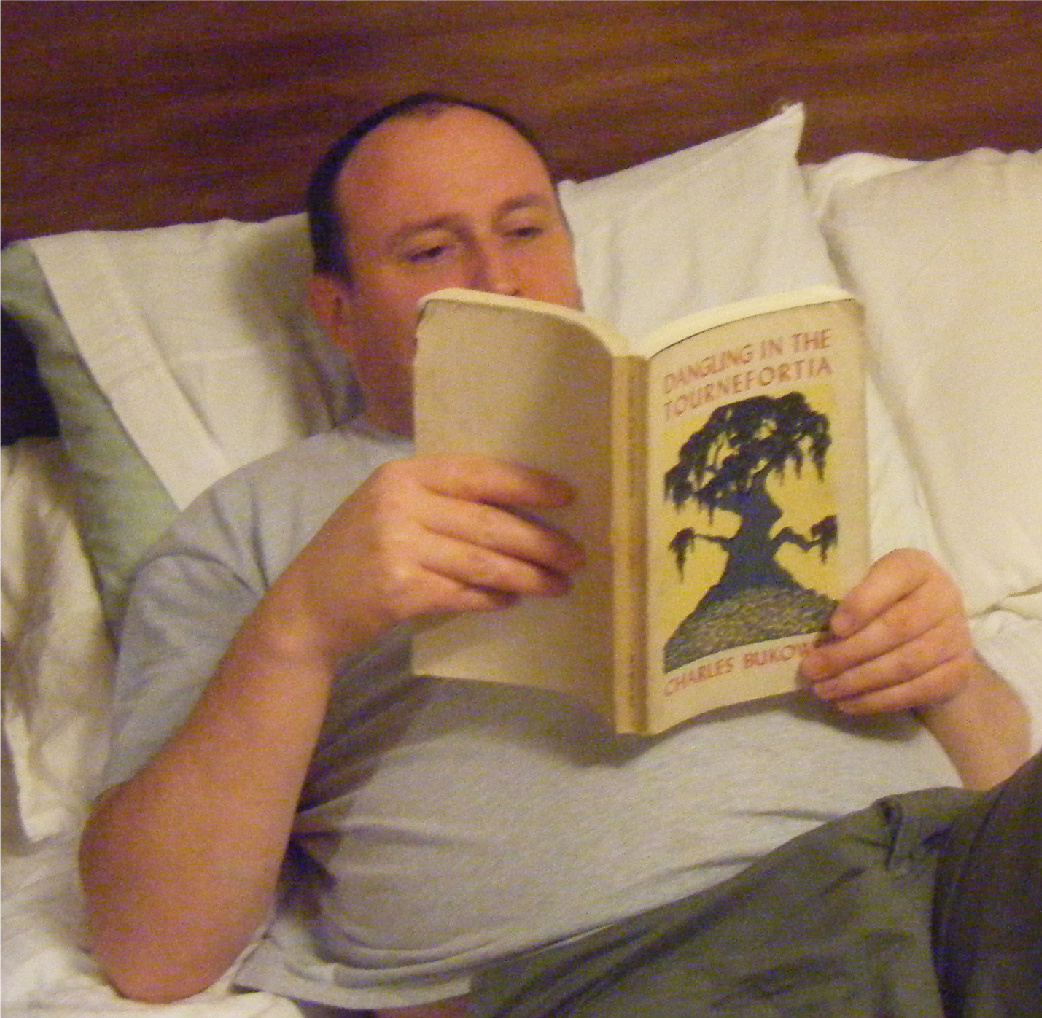Courtyard Memores

I sat in the
naked courtyard,
attempting to focus
on my copy of Bukowski’s
collected works.
You passed by with
a small frown on your young,
perfect visage.
My olfactory senses
picked up the scent of lilies
emanating from you.
I battled back and forth
in my mind whether to
say hello.
I took a deep sigh, readjusted
my focus, and found my place.
In Bukowski's Work
["memore" is an Italian adjective meaning "mindful"]

[Poetry is what happens when nothing else can -- Charles Bukowski]
Heinrich Karl Bukowski, Jr., was born in Andernach, Germany in August 1920, the son of a German woman and an American soldier who was part of the Allied occupation force after World War I. Two years later they moved to the US. His father was often jobless and physically abusive, and Bukowski became an alcoholic at an early age. His debut as a writer was "Aftermath of a Lengthy Rejection Slip" in the March-April 1944 issue of "Story" (The fictional notice ["Dear Mr. Bukowski: Again, this is a conglomeration of extremely good stuff and other stuff so full of idolized prostitutes, morning-after vomiting scenes, misanthropy, praise for suicide etc. that it is not quite for a magazine of any circulation at all. This is, however, pretty much a saga of a certain type of person and in it I think you've done an honest job."] was a good description of the themes and attitudes that later brought him great renown.) But he quit writing and worked as a mail carrier for 3 years. In 1955 he was hospitalized in a charity ward and admonished to stop drinking, but he resumed the habit as soon as he was released. He also began writing poetry, which Barbara Frye began publishing in "Harlequin." In their correspondence she confessed that she had no neck, due to a congenital deformity, and worried that no one would ever marry her; Bukowski wrote back to say he would, though their marriage only lasted 2 years. In 1959 he returned to the post office as a mail sorter and published his 1st chapbook, "Flower, Fist and Bestial Wail." It had a print run of 200 copies. In the 1960s Jon Edgar Webb, who had been imprisoned in the Ohio State Reformity in Mansfield for 30 months for armed robbery in the 1930s before becoming a littérateur, began featuring Bukowsky's work in "The Outsider" and also published 2 of his poetry collections. In 1965 Bukowsky published his 1st short story "Confessions of a Man Insane Enough to Live with Beats." Soon he was contributing weekly "Notes of a Dirty Old Man" to the underground Los Angeles newspaper "Open City;" in 1969 Lawrence Ferlinghetti's City Lights published these essays, and in 1972 it printed his 1st book of short stories, "Ejaculations, Exhibitions and General Tales of Ordinary Madness." He gained a following in Europe, becoming the most popular American writer in his homeland, and Jean Genet and Jean-Paul Sartre both regarded him as America's greatest poet, but he was never anthologized in his lifetime in the US. In 1969 John Martin, a book collector and chap book publisher, offered him $100 a month for life if he quit his job and wrote full time. Martin established the Black Sparrow Press to publish Bukowski and, in addition to his poems and short stories, brought out his 1st novel "Post Office" in 1971. Despite being ignored by the literary establishment in the US, by the 1970s he was making hundreds of thousands of dollars a year in royalties. In 1973 Taylor Hackford made a documentary ("Bukowski") which won the San Francisco Film Festival's Silver Reel Award for best cultural film on public TV. In 1987 Bukowsky wrote "Barfly," a semi-autobiographic film by Barbet Schroeder which starred Mickey Rourke as himself.
ReplyDelete